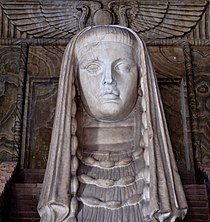Villa Adriana
| Villa Adriana (Tivoli) | |
|---|---|
| Name as inscribed on the World Heritage List | |
 |
|
| Location | Italy |
| Type | Cultural Location |
| Criteria | i, ii, iii |
| Reference | 907 |
| UNESCO region | Europe |
| Inscription history | |
| Inscription | 1999 (23rd Session) |
 |
|
|
|
The Hadrian's Villa (Villa Adriana in Italian) is a large Roman archaeological complex at Tivoli, Italy. It is a property of the Republic of Italy, and directed and run by the Polo Museale del Lazio since December 2014.
The villa was constructed at Tibur (modern-day Tivoli) as a retreat from Rome for Roman Emperor Hadrian during the second and third decades of the 2nd century AD. Hadrian was said to dislike the palace on the Palatine Hill in Rome, leading to the construction of the retreat.
The picturesque landscape around Tibur had made the area a popular choice for villas and rural retreats. It was reputedly popular with people from the Spanish peninsula resident in the city of Rome. This may have contributed to Hadrian's choice of the property - although born in Rome his parents came from Spain and he may have been familiar with the area during his early life.
There may also have been a connection through his wife Vibia Sabina (83–136/137) who was the niece of the Emperor Trajan. Sabina's family held large landholdings and it is speculated the Tibur property may have been one of them. A villa from the Republican era formed the basis for Hadrian's establishment.
During the later years of his reign, Hadrian actually governed the empire from the villa. Hadrian started using the Villa as his official residence around AD 128. A large court therefore lived there permanently and large numbers of visitors and bureaucrats would have to have been entertained and temporarily housed on site. The postal service kept it in contact with Rome 29 km (18 mi) away, where the various government departments were located.
It isn't known if Hadrian's wife lived at the villa either on a temporary or permanent basis - his relations with her were apparently rather strained or distant, possibly due to his ambiguous sexuality. Hadrian's parents had died when he was young and he and his sister were adopted by Trajan. It is possible that Hadrian's court at the villa was predominately male but it's likely that his childhood nurse Germana, whom he had formed a deep attachment to, was probably accommodated there (she actually outlived him).
...
Wikipedia
